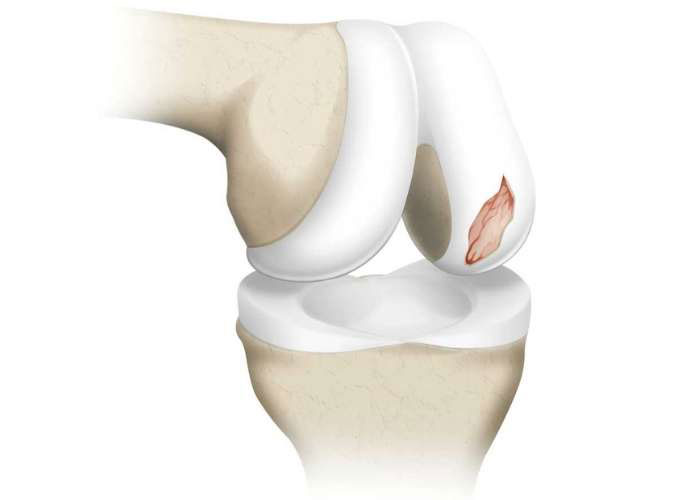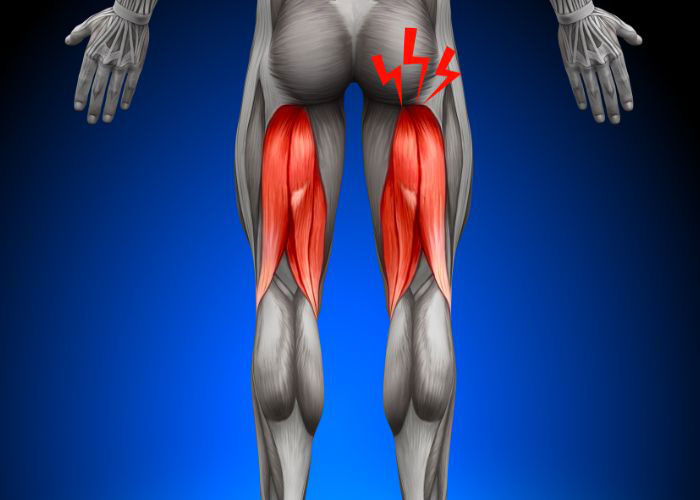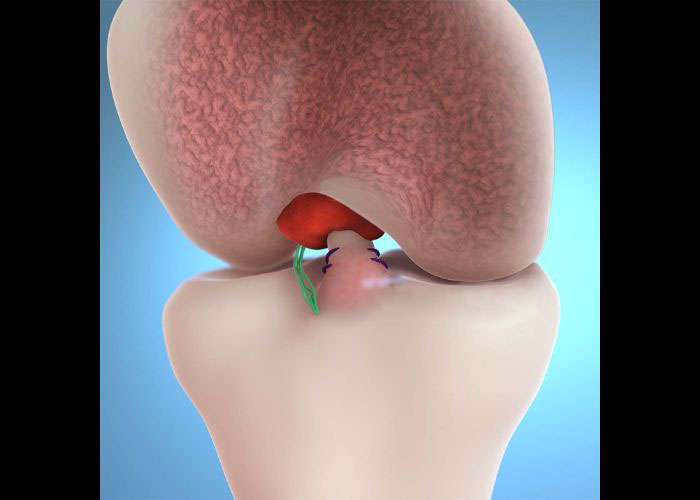What is an articular cartilage injury?
The knee joint is formed by the lower end of the femur (thigh bone) and the upper end of the tibia (shin bone). The ends of these bones are covered in a shiny white connective tissue known as articular cartilage. This cartilage adds a layer of protection to the bones, but its main responsibility is to reduce friction allowing painless knee joint movement. A traumatic injury to the knee joint, or even the normal “wear-and-tear” of the joint, can result in damage to this articular cartilage. Over time, cartilage damage can lead to osteoarthritis, a painful condition characterized by bone-on-bone joint movement.
What is the treatment for an articular cartilage injury?
Patients with small or isolated articular cartilage defects may benefit from conservative treatment measures such as rest, ice, and non-steroidal anti-inflammatory medications (NSAIDs). However, failed conservative therapy or significant articular cartilage damage may necessitate surgical intervention to restore the articular cartilage. Patients with a singular cartilage injury or defect are more likely to benefit from surgical intervention than patients with multiple cartilage lesions. There are a number of surgical strategies that can be implemented for articular cartilage restoration. Dr. Ronak Mukesh Patel, orthopedic knee doctor, treats patients in Sugar Land, Pearland, and the Houston, Texas area, who have experienced an articular cartilage knee injury and are in need of articular cartilage restoration.

How is articular cartilage restoration performed?
Dr. Patel can employ a number of various surgical techniques to restore the articular cartilage. Surgical intervention should only be performed by an experienced orthopedic knee surgeon as each procedure is tailored to each’s patient’s specific injury or cartilage defect. The following are some of the restoration techniques that can be implemented by Dr. Patel:
- Chondroplasty: This simple procedure, also known as debridement, involves the removal of damaged cartilage fragments to reduce any pain and inflammation. Patients with full-thickness cartilage injuries are not candidates for this procedure.
- Microfracture: Specialized surgical instruments create openings within the bone to induce the natural healing response of a bone bleed. The cells from the blood supply penetrate the damaged cartilage to harden into new cartilage.
- Matrix-associated Autologous Chondrocyte Implantation (MACI): This procedure is completed in two stages. A biopsy of healthy cartilage is taken from the knee and grown in a lab. Once this tissue fragment has grown to the appropriate size, it is then implanted into the knee during a second surgery.
What is the recovery period like after articular cartilage restoration?
The specific surgical technique performed by Dr. Patel largely determines the recovery period following articular cartilage restoration. Patients can expect a full recovery from a chondroplasty procedure in approximately 6 weeks, while a full recovery from MACI from 6-12 months depending on the activity level and sports. Patients in the Houston, Texas area can anticipate the following during the recovery process:
- Immobilization of the knee joint may occur immediately following surgery, and continue for 6 to 8 weeks, as a protective measure for the new cartilage.
- Patients who underwent a chondroplasty should limit weight-bearing with the assistance of crutches for up to a week after surgery.
- A machine for continuous passive motion (CPM) can be used for up to 6 weeks after surgery.
- Post-operative pain management is encouraged with a combination of rest, ice, and non-steroidal anti-inflammatory medications (NSAIDs).
- The key to a successful recovery following articular cartilage restoration is active participation and completion of a strict physical rehabilitation program that is tailored to the specific surgical technique performed.
Articular Cartilage Restoration Surgeon

If you have damaged the articular cartilage in your knee, you are at risk of developing osteoarthritis. Articular cartilage can be restored by several proven orthopedic methods that can help delay a knee replacement. Articular cartilage restoration surgeon, Doctor Ronak Mukesh Patel, provides diagnosis as well as many different treatment options for damaged articular cartilage in the knee for patients in Houston, Sugar Land, and Pearland, TX. Contact Dr. Patel’s team today!








